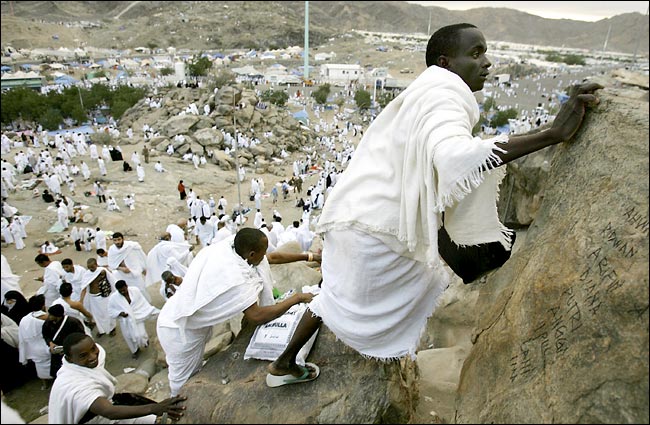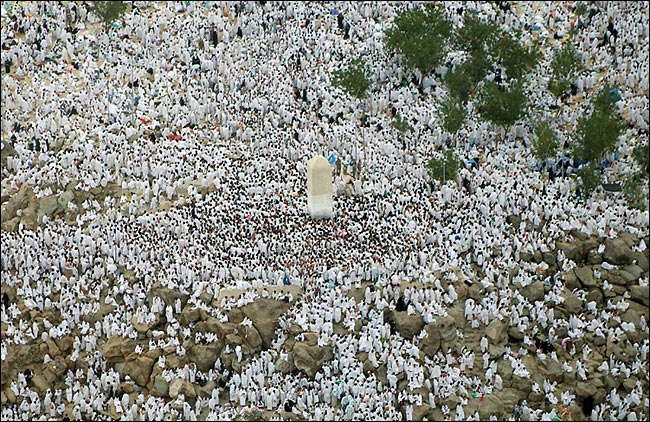|
January 19, 2005 Top Saudi Cleric Blasts Attacks on NationBy THE ASSOCIATED PRESS
MOUNT ARAFAT, Saudi Arabia (AP) -- Saudi Arabia's top cleric told 2 million hajj pilgrims Wednesday that some of Islam's own son's had been "lured by the devil'' to conduct violent attacks on the kingdom and charged that the non-Muslim world was conspiring against the people of the faith. The pilgrims converged on Mount Arafat for the climax of the hajj, their eyes welled with tears as they prayed on the most critical day of the annual pilgrimage the faithful believe will wipe away their sins. Sheik Abdul-Aziz al-Sheik, speaking at a mosque near Mount Arafat on the climactic day, lamented the violence waged by Muslim militants against Saudi Arabia. "The greatest affliction to strike the nation of Islam came from some of its own sons, who were lured by the devil,'' the cleric said. "They have called the nation infidel, they have shed protected blood and they have spread vice on earth, with explosions and destruction and killing of innocents.'' He pointedly asked of Muslim youth: "How would you meet God? With innocent blood you shed or helped shed?'' He warned them not to be used by enemies of the nation to weaken it. "Oh, Allah, at thy service,'' the pilgrims chanted, as they swarmed on foot and in motor vehicles to the mountain plains, 12 miles southwest of Mecca. Raising their hands to the sky, many pilgrims had tears in their eyes as they prayed on a day of soul searching and prayer interpreted as a foretaste of Judgment Day. Men and women, otherwise not allowed to mix in the conservative kingdom, rubbed shoulders and stretched helping hands to each other as they climbed the uneven but gentle slope. Many already atop pushed and shoved to hug a pillar, standing where Islam's 7th century prophet Muhammad gave his last sermon in the year 632, three months before his death. Helicopters hovered above the plain, dotted by pilgrims all the way to the peak of Mount Arafat. Some paused for photographs; men in seamless white robes and women, covered from head to foot except for their hands and faces, held prayer booklets and recited the Quran. The cleric, al-Sheik, said that campaigns were being waged against Muslims from outside the Islamic world -- "military campaigns, thought campaigns, economic campaigns, and media campaigns. "They are all against this religion. The nation was described as a terrorist nation, that we are terrorists and backward,'' he said. "Conferences have been held and conspiracies have been woven ... all unjustly and unfairly.'' Al-Sheik urged worshippers to abide the words of God and his prophet and not be "fooled by a civilization known for its weak structure and bad foundation.'' Saudi pilgrim Abdullah Abdel-Latif, 34, said he agreed with the cleric's sermon. "Something has to be done to glorify the name of Islam. The evil work of a few is giving the religion a bad name unnecessarily,'' the bearded man said, urging non-Muslims not to jump to conclusions about Islam. Later, the pilgrims headed to Muzdalifa, where on Thursday they will each throw seven pebbles at pillars in a symbolic stoning of the devil. Many pilgrims then shave or trim their hair as a symbol of rebirth. Abdullah Salam, from Muscat, Oman, searched on the dirt path for his seven pebbles, mixing with young and old, men and women, rich and poor from around the world. "This is an obligation to God and I don't mind it,'' he said of the crowded scrambling for pebbles. "Who wouldn't want to get the devil for luring us from the right path?'' Saudi officials have taken extra precautions this year to prevent the deadly stampedes that have marred the ritual in the past. Last year, 244 pilgrims died in a stampede; 1,426 died in a similar fashion in 1990. About 10,000 forces -- including traffic and crowd control -- will patrol the area Thursday to ensure the smooth flow of the ritual. Authorities have erected three new pillars, wider and taller than ones used previously, so more pilgrims can throw stones at the same time. A foot bridge leading to the pillars has also been expanded to accommodate more people and includes two new emergency exits. "We are very confident that we will be able to handle the crowd,'' Interior Ministry spokesman Brig. Gen. Mansour al-Turki said. "Pilgrims will also have to do their part to avoid accidents.'' The hajj -- required at least once in the lifetime of every able-bodied Muslim who can afford it -- began in Mecca earlier this week with the circling of the Kaaba, the large cubic stone structure that Muslims face during their five daily prayers. Thursday marks the beginning of Eid al-Adha, or the Feast of the Sacrifice. Saudi Arabia has imported more than 1 million sheep for slaughter on that day.
|


